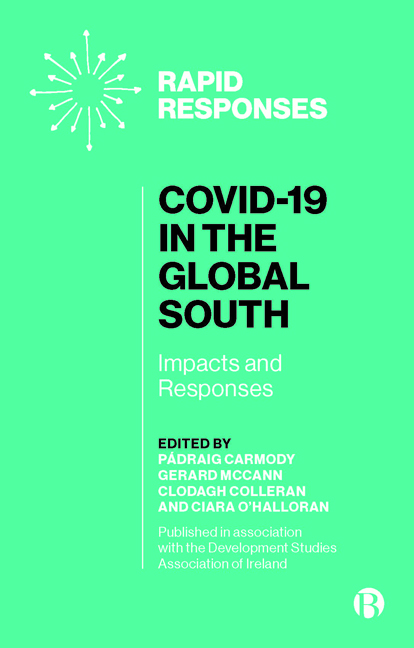7 - Policy Milieu for Combatting COVID-19 and Sustainability of African Economies
Published online by Cambridge University Press: 23 March 2021
Summary
Context
COVID-19 has spread around the world, infecting millions of people (Li et al, 2020; UNCTAD, 2020). The socioeconomic impacts of the pandemic have become realities around the world and poor and developing countries in Africa have received a significant shock as a result. The unique context of Africa is due to the large population in poverty and the high burden of disease (principally, malaria). The burden of malaria in Africa is responsible for over 380,000 deaths per year, with the continent accounting for 93 per cent of global malaria cases (213 million cases out of 228 million cases), and 94 per cent of 405,000 deaths globally from malaria in 2018 (WHO, 2019). Furthermore, almost all of the 55 countries in Africa are classified as low-or middle-income, with only the Seychelles in the high-income category (World Bank, 2019). Worse still, the two largest economies (Nigeria and South Africa) are home to significant poverty and inequality.
The wide geographic spread of the coronavirus has necessitated policies and guidelines for containment (Medinilla et al, 2020; Olayide, 2020). The policy guidelines on containment of coronavirus have centred essentially on prevention and on social and hygiene practices, including: staying at home; regular washing of hands or use of sanitizer; social and physical distancing; wearing of protective mask and kits; limiting the number of people in public gatherings; restriction of human and vehicular movement or curfew or travel ban; and total or partial lockdown (WHO, 2020). It is instructive to note that the policy measures to contain the spread of coronavirus range from individual to international levels (Figure 7.1).
Similarly, one of the first policy measures taken by many African governments in curtailing the spread of the virus was placing a travel ban on their citizens and foreigners coming into the continent (World Bank, 2020a). Generally, lockdown was at the centre of containment measures, with Rwanda being the first African country to adopt this (Mugabi, 2020). This was followed by Egypt, Morocco and other countries like Malawi, Botswana and Nigeria banning public gatherings and closing down schools (Kondowe, 2020). At the subnational level, African governments placed restrictions on intra and inter-state movement of people and goods, allowing only food, health materials and other essential materials to be moved.
- Type
- Chapter
- Information
- COVID-19 in the Global SouthImpacts and Responses, pp. 75 - 84Publisher: Bristol University PressPrint publication year: 2020



